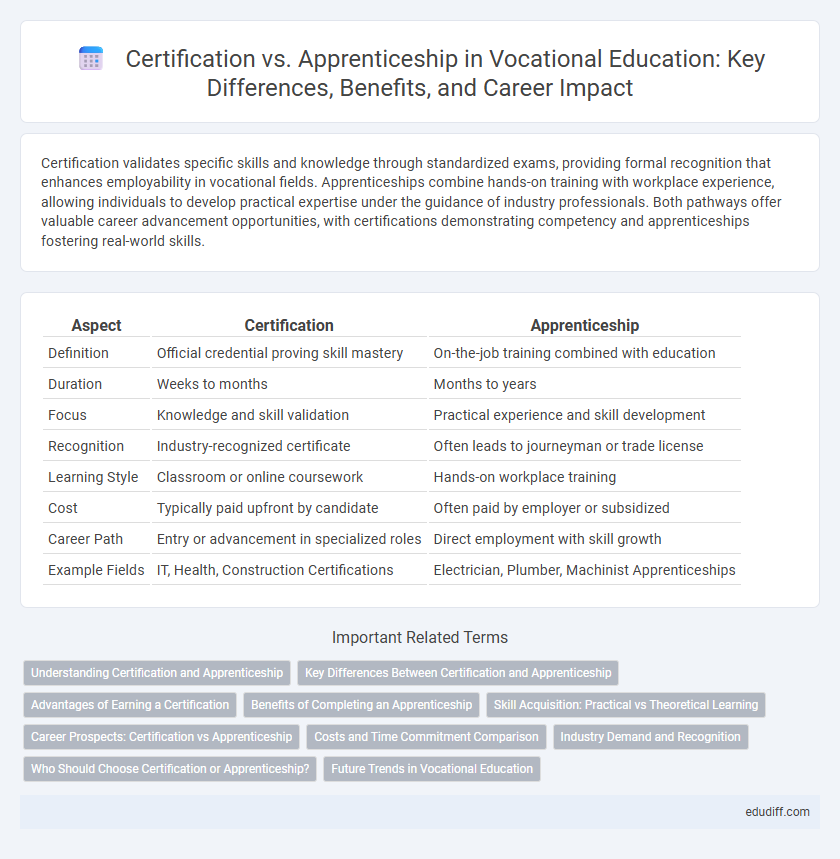Certification validates specific skills and knowledge through standardized exams, providing formal recognition that enhances employability in vocational fields. Apprenticeships combine hands-on training with workplace experience, allowing individuals to develop practical expertise under the guidance of industry professionals. Both pathways offer valuable career advancement opportunities, with certifications demonstrating competency and apprenticeships fostering real-world skills.
Table of Comparison
| Aspect | Certification | Apprenticeship |
|---|---|---|
| Definition | Official credential proving skill mastery | On-the-job training combined with education |
| Duration | Weeks to months | Months to years |
| Focus | Knowledge and skill validation | Practical experience and skill development |
| Recognition | Industry-recognized certificate | Often leads to journeyman or trade license |
| Learning Style | Classroom or online coursework | Hands-on workplace training |
| Cost | Typically paid upfront by candidate | Often paid by employer or subsidized |
| Career Path | Entry or advancement in specialized roles | Direct employment with skill growth |
| Example Fields | IT, Health, Construction Certifications | Electrician, Plumber, Machinist Apprenticeships |
Understanding Certification and Apprenticeship
Certification validates specific skills and knowledge through standardized exams offered by recognized industry organizations, ensuring competency in a vocational field. Apprenticeship combines on-the-job training with classroom instruction, allowing individuals to gain practical experience while earning credentials over time. Both pathways enhance employability but differ in structure, with certification focusing on proof of expertise and apprenticeship emphasizing hands-on learning and skill development.
Key Differences Between Certification and Apprenticeship
Certification validates specific skills and knowledge through standardized testing, often recognized industry-wide, while apprenticeship combines on-the-job training with classroom instruction, emphasizing practical experience. Certifications are typically completed within a set timeframe and can be renewed periodically, whereas apprenticeships usually span multiple years, allowing for hands-on mastery and mentorship. Employers often view certifications as proof of competency, whereas apprenticeships demonstrate proven experience and real-world application in a vocational field.
Advantages of Earning a Certification
Earning a certification enhances professional credibility by demonstrating verified skills and knowledge recognized across industries, facilitating better job prospects and higher salaries. Certifications offer flexible, often shorter learning paths compared to apprenticeships, enabling quicker entry or advancement in specialized vocational fields. Employers prioritize certified candidates for their proven expertise, increasing opportunities for career growth and competitive advantage in the labor market.
Benefits of Completing an Apprenticeship
Completing an apprenticeship offers practical, hands-on experience that directly enhances job readiness and skill proficiency in a specific trade or profession. Apprenticeships provide earning opportunities while learning, enabling individuals to gain financial independence without student debt. Employers highly value apprenticeship graduates for their proven on-the-job expertise, often leading to higher job placement rates and career advancement.
Skill Acquisition: Practical vs Theoretical Learning
Certification programs emphasize theoretical knowledge and formal assessments to validate expertise, equipping learners with a broad understanding of vocational standards. Apprenticeships prioritize hands-on, practical skill acquisition through real-world experience and mentorship, fostering proficiency in specific tasks. This practical learning approach often results in more immediate workplace readiness compared to predominantly classroom-based certification.
Career Prospects: Certification vs Apprenticeship
Certification programs validate specialized skills and knowledge, often leading to faster job placements in industries like IT, healthcare, and manufacturing. Apprenticeships provide hands-on experience and direct mentorship, which enhance practical skills and typically result in higher earning potential over time. Career prospects improve significantly when combining certifications with apprenticeship credentials, as employers value both theoretical knowledge and real-world application.
Costs and Time Commitment Comparison
Certification programs typically require lower upfront costs and shorter time commitments, often lasting a few months to a year, making them more accessible for individuals seeking quick entry into a vocational field. Apprenticeships involve longer durations, usually spanning one to six years, with minimal or no direct costs as participants earn wages while gaining hands-on experience. Choosing between certification and apprenticeship depends on balancing immediate financial investment against long-term skill development and earning potential.
Industry Demand and Recognition
Certification programs, widely recognized across industries, provide standardized credentials that validate specific skills and knowledge, aligning with employer demand for qualified professionals. Apprenticeships offer hands-on experience and mentorship within a trade, often resulting in deep industry integration and practical expertise highly valued by employers. Industry demand increasingly favors candidates who combine certified competencies with real-world apprenticeship experience for comprehensive job readiness.
Who Should Choose Certification or Apprenticeship?
Individuals seeking rapid entry into a skilled trade with formal recognition often choose certification for its standardized assessment and industry-wide acceptance. Those preferring hands-on experience and mentorship in real work environments typically opt for apprenticeships, which combine on-the-job training with classroom instruction. Employers valuing practical skills and proven work readiness may favor candidates who have completed apprenticeships, while industries requiring strict credential verification prioritize certifications.
Future Trends in Vocational Education
Emerging trends in vocational education highlight an increasing integration of certification programs and apprenticeship models to enhance workforce readiness and skill validation. Digital credentialing and micro-credentials are gaining prominence, allowing learners to demonstrate specific competencies aligned with industry demands more flexibly than traditional certifications. Apprenticeships are evolving with technology-driven apprenticeships and hybrid learning environments, fostering real-time skill acquisition and boosting employability in rapidly changing labor markets.
Certification vs Apprenticeship Infographic

 edudiff.com
edudiff.com